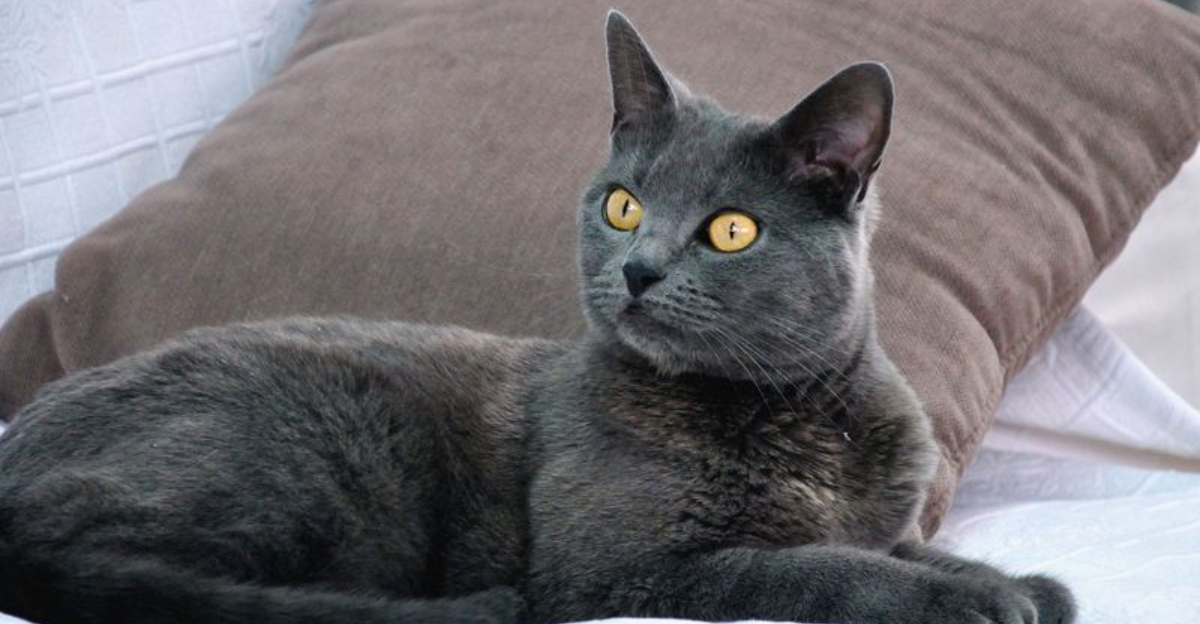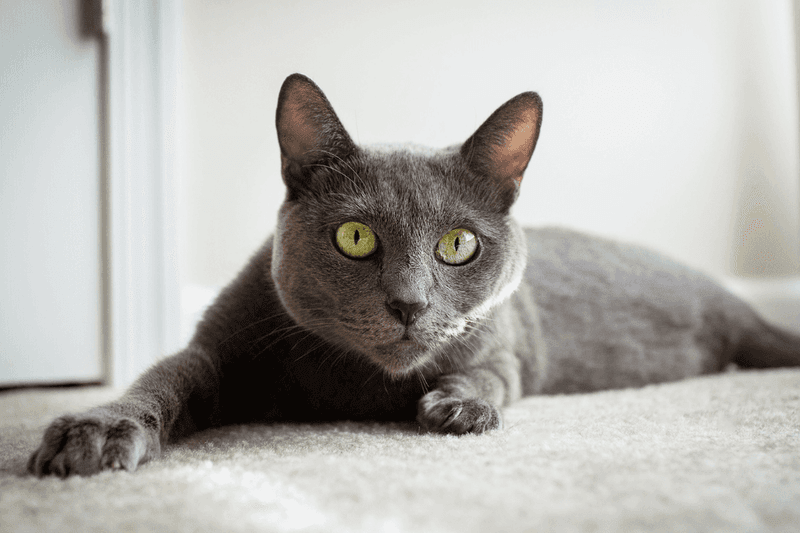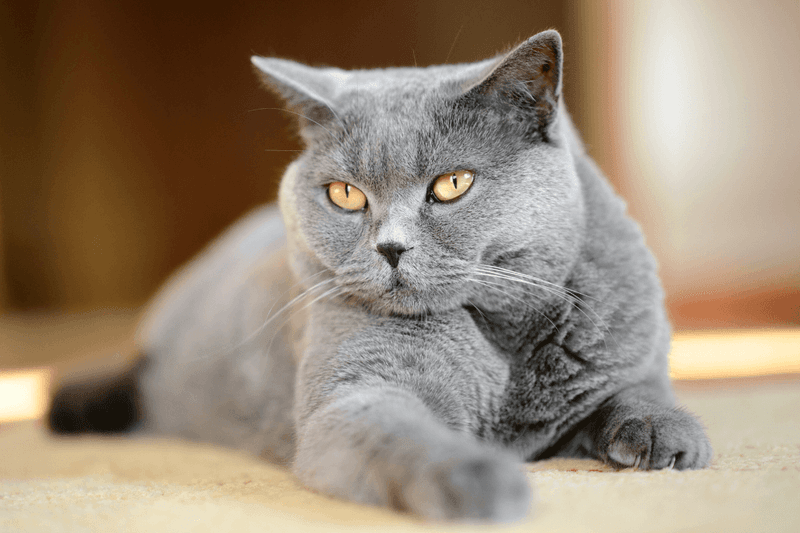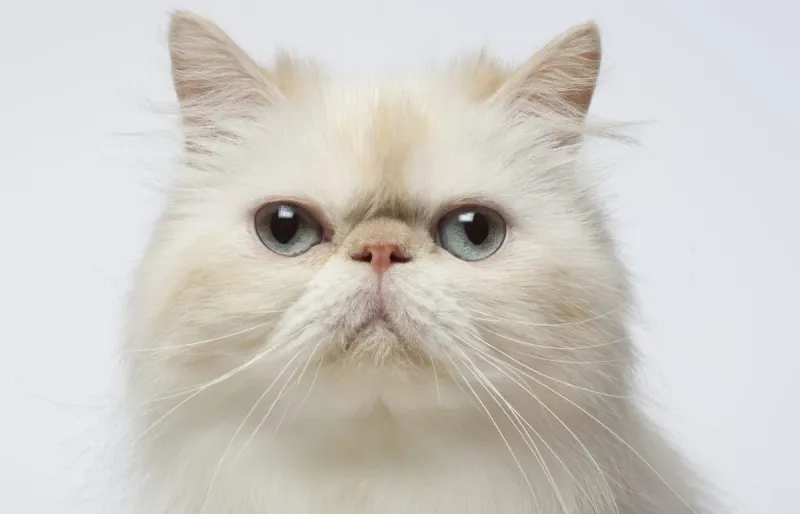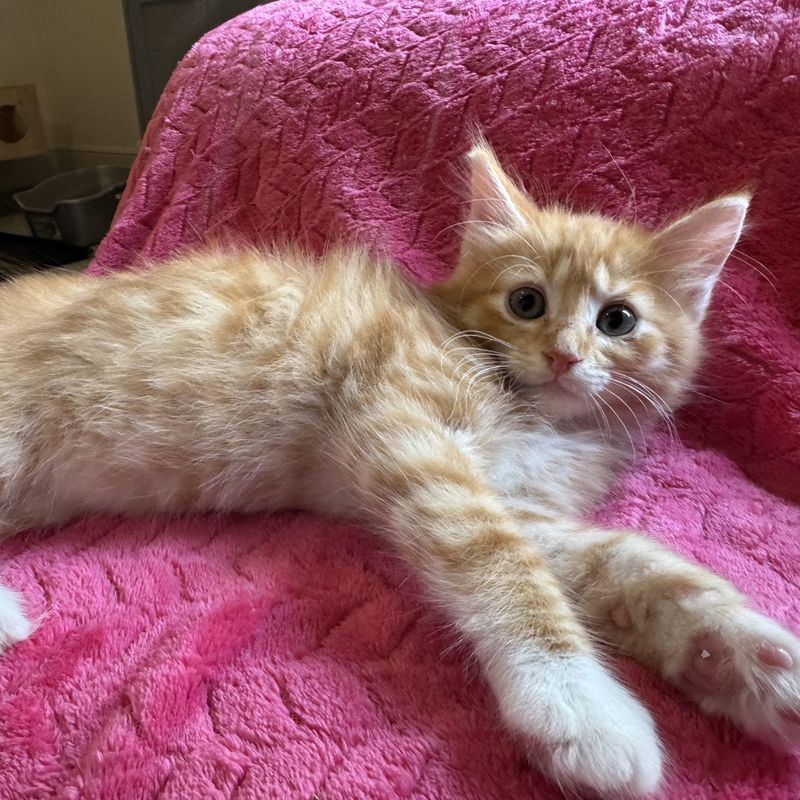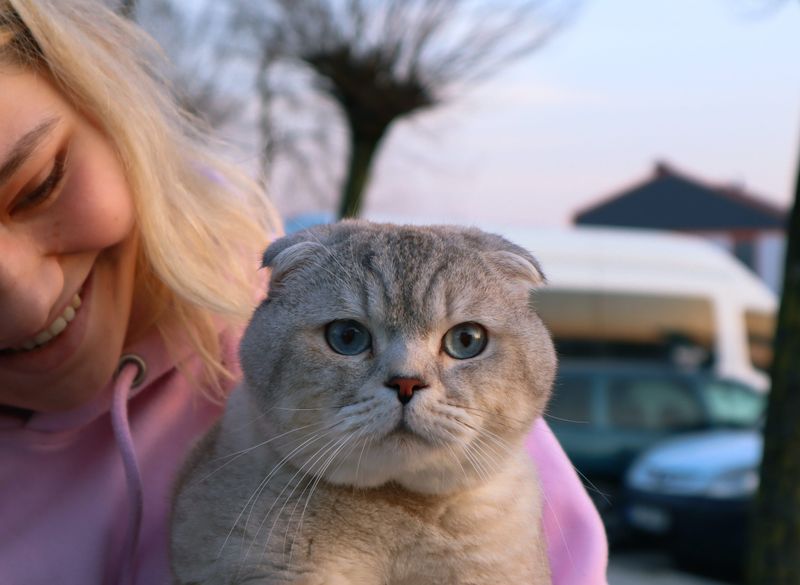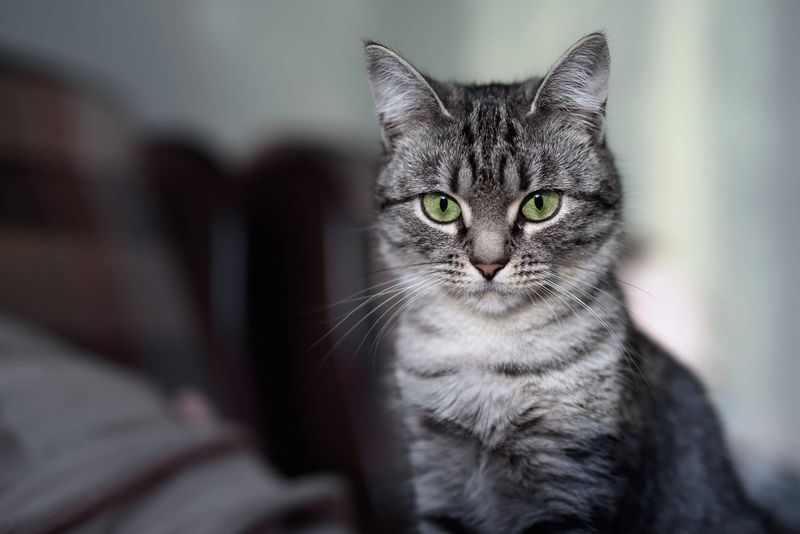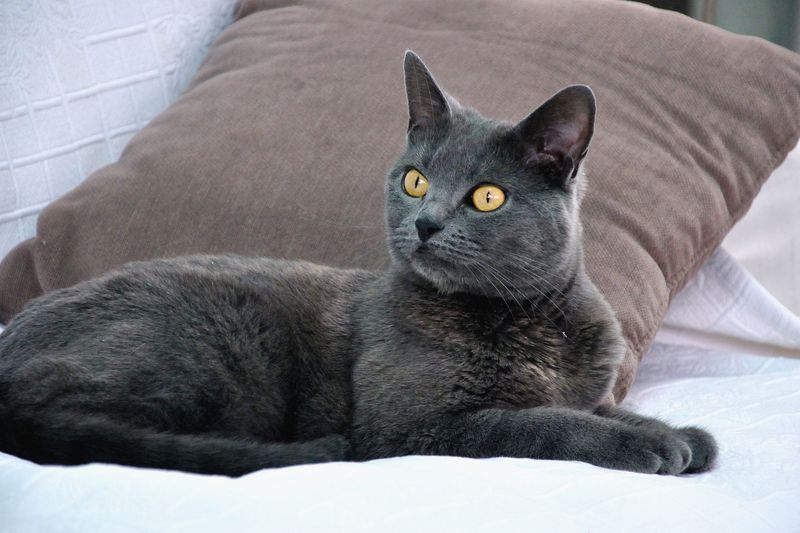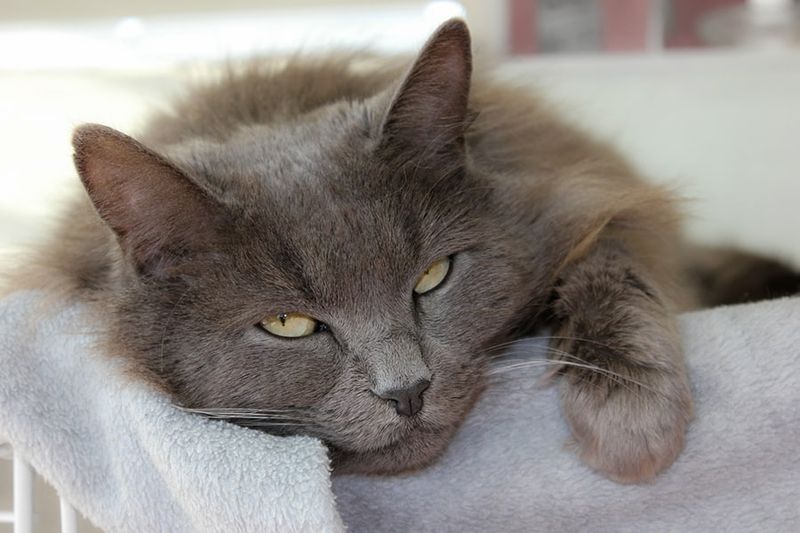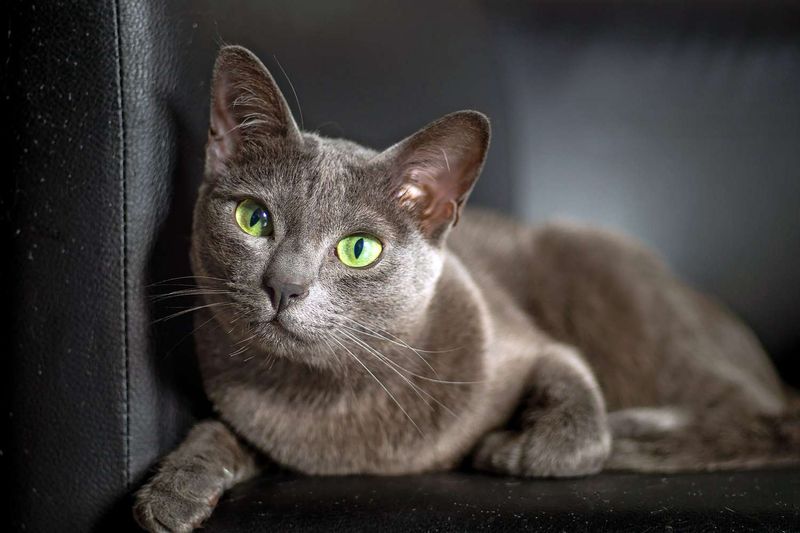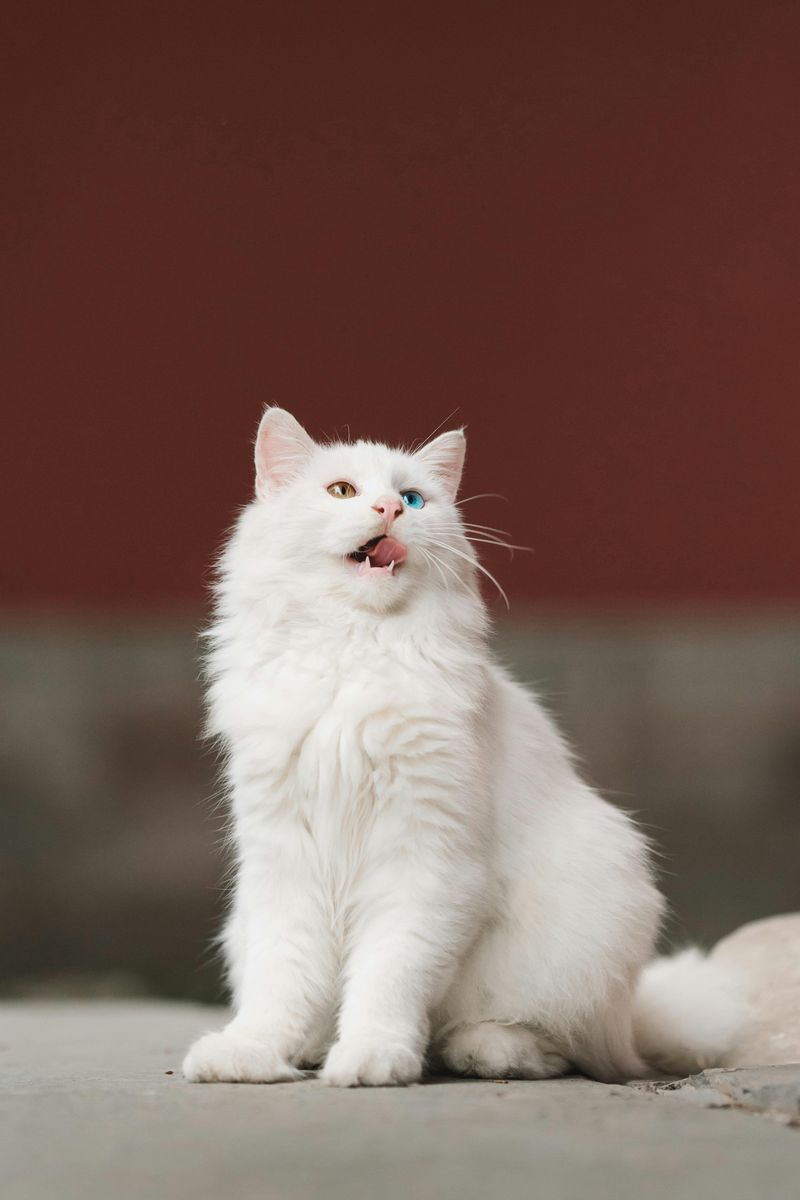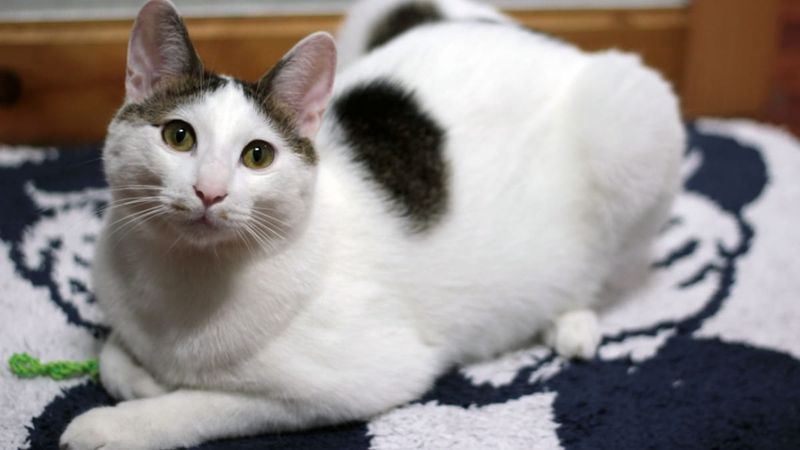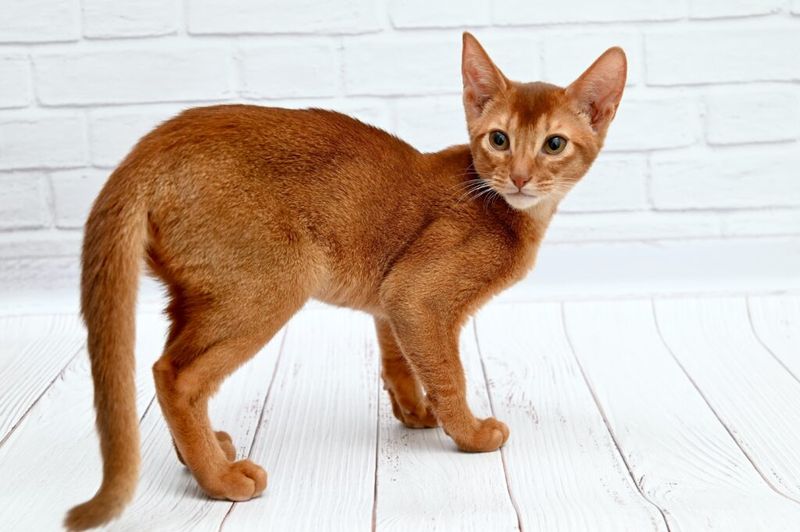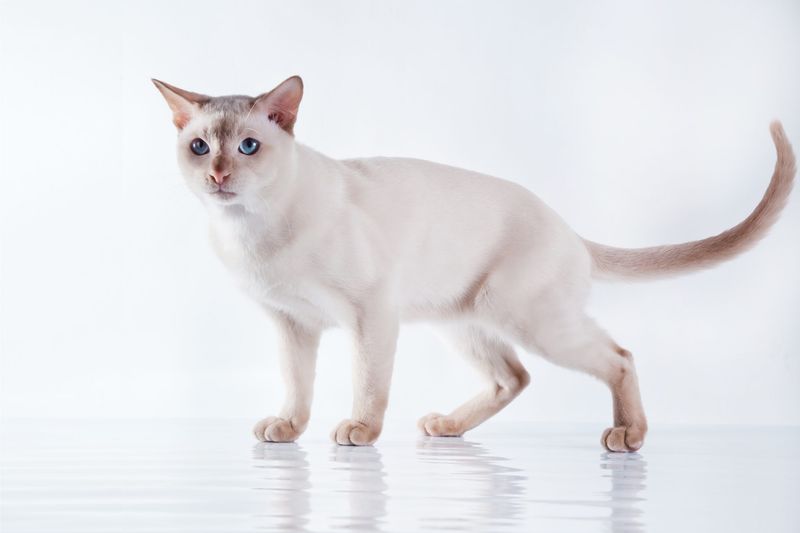📖 Table of Content:
Not all cats crave constant cuddles or playtime. Some feline friends prefer a relationship built on mutual respect and quiet understanding rather than non-stop interaction. These independent breeds thrive in homes where they’re given space to be themselves, coming for affection on their own terms. Understanding which cats prefer this hands-off approach can help you find the perfect match for your lifestyle.
1. Russian Blue
Reserved and thoughtful, Russian Blues form deep bonds with their humans but rarely demand attention. They observe their surroundings carefully before deciding to engage.
When you earn a Russian Blue’s trust, they’ll show affection in subtle ways – sitting nearby rather than on your lap, or following you from room to room at a respectful distance. These silver-blue beauties appreciate routine and predictability.
Russian Blues excel in quiet households where they can maintain their dignified demeanor without constant social pressure. They’re perfect for people who appreciate a cat’s company without neediness.
2. British Shorthair
British Shorthairs embody the independent spirit while maintaining a steady, reliable presence in your home. Their plush teddy-bear appearance belies their self-sufficient nature.
Unlike attention-seeking breeds, these cats prefer to hang out near you rather than on you. They’ll often find a comfortable spot within eyesight but just beyond petting range. British Shorthairs rarely initiate games or demand playtime.
Famous for their easygoing temperament, they adapt well to most living situations as long as their need for respectful space is honored. They’re particularly suited for busy professionals who can’t provide constant interaction.
3. Persian
Behind those sweet faces and luxurious coats, Persians harbor a distinctly reserved personality. They approach relationships with quiet dignity, preferring peaceful environments where they can lounge undisturbed.
Persians rarely seek attention through loud meows or playful antics. Instead, they communicate through soft purrs and gentle head bumps when they decide it’s time for affection. Their slow-paced lifestyle means they’re content to watch household activities from comfortable perches.
Many Persian owners describe their cats as roommates rather than pets – sharing space respectfully without constant interaction. This makes them ideal companions for those who appreciate beauty and tranquility over playfulness.
4. Norwegian Forest Cat
Norwegian Forest Cats carry themselves with a wild independence that reflects their woodland heritage. These majestic felines don’t need constant reassurance or attention from their humans.
Their self-assured nature means they’re comfortable spending hours entertaining themselves, whether watching birds from windows or exploring quiet corners of your home. When a Norwegian Forest Cat does seek interaction, it feels like a special honor rather than routine behavior.
Despite their independent streak, these cats form strong bonds with their families. They simply express affection on their terms – perhaps joining you for evening relaxation after spending the day in solitary pursuits.
5. Scottish Fold
With their unique folded ears and calm demeanor, Scottish Folds strike a balance between being independent and lovingly affectionate. Their quiet personality is as captivating as their appearance.
Unlike demanding breeds, Scottish Folds respect personal boundaries and rarely intrude when you’re busy. They’re content to observe household activities from comfortable vantage points, processing everything with their characteristically thoughtful demeanor.
These cats form strong bonds through quiet presence rather than constant physical contact. A Scottish Fold might spend hours near you without requiring hands-on attention – the feline equivalent of comfortable silence between good friends.
6. American Shorthair
Known for their self-sufficient spirit, American Shorthairs trace back to ship and barn cats that earned their keep through skill and independence, not constant companionship.
These cats appreciate a respectful relationship where neither party is clingy. They’ll happily entertain themselves for hours, then seek brief, quality interactions on their own schedule. American Shorthairs rarely demand attention through vocal or destructive behaviors.
Their balanced temperament makes them excellent companions for households with varying activity levels. They adapt to your routine rather than forcing you to adapt to theirs – a refreshing quality in today’s pet-centered culture.
7. Chartreux
Combining a calm independence with understated loyalty, Chartreux cats have been beloved by French cat lovers for centuries due to their gentle, undemanding nature.
Silent observers by nature, Chartreux rarely vocalize their needs or demands. They communicate primarily through body language and expressive eyes, approaching for attention only when they sense you’re receptive. Their patience is legendary – they’ll wait for an invitation rather than insisting on interaction.
These cats excel at reading human moods, making them sensitive companions who respect boundaries. A Chartreux will quietly disappear when you need space and reappear when company would be welcome.
8. Nebelung
Nebelungs approach relationships with a delicate balance of attachment and autonomy that sophisticated cat lovers appreciate. Their name means “creature of mist” in German – perfectly capturing their ethereal presence in the home.
Sensitive to household dynamics, these silver-blue beauties prefer environments where they can observe from safe distances before deciding to engage. They form deep bonds with their chosen people but express affection through proximity rather than demanding physical contact.
Nebelungs thrive with owners who understand that respect for their boundaries actually strengthens the human-cat connection. They remember both kindness and forced interaction, making them ideal for patient owners who value building trust over instant gratification.
9. Korat
Hailing from Thailand, Korats are known for forming deep, undemanding bonds instead of seeking constant attention. These silver-blue cats have been cherished as good luck charms for hundreds of years.
Unlike attention-seeking breeds, Korats observe household patterns carefully, integrating themselves thoughtfully rather than demanding center stage. They choose their moments of interaction with deliberate intention, making each connection feel significant.
Their quiet confidence means they rarely engage in attention-seeking behaviors like excessive meowing or destructive antics. Korats excel in households where members appreciate the subtle art of feline companionship – being together without constant interaction.
10. Turkish Angora
With their graceful looks, Turkish Angoras strike a balance between being independent and quietly social. They enjoy spending time with people but are perfectly content without constant interaction.
Their self-assured nature means they’re comfortable spending hours in solitary pursuits, from window-watching to exploring quiet corners of your home. When a Turkish Angora does seek interaction, it feels like a compliment rather than an obligation.
These cats form strong but respectful bonds with their families, expressing affection through quiet presence rather than demanding behaviors. They thrive in homes where their intelligence and autonomy are respected rather than constrained.
11. Japanese Bobtail
With a proud heritage as temple cats, Japanese Bobtails carry themselves with calm dignity and strike a balance between friendly curiosity and self-reliance.
Unlike clingy breeds, these cats maintain healthy boundaries, preferring to interact on mutual terms rather than demanding constant attention. They’re content to observe household activities from comfortable perches, processing everything with their characteristically thoughtful demeanor.
Japanese Bobtails form meaningful bonds through shared space and occasional interaction rather than constant physical contact. They excel in households where members understand that quality connection doesn’t require constant engagement – making them perfect for busy but loving homes.
12. Abyssinian
Challenging the idea that energetic cats demand constant care, Abyssinians are smart and independent, happily entertaining themselves yet still bonded to their people.
Unlike needier breeds, Abyssinians respect personal space and rarely demand interaction through vocal or physical means. They’re content to parallel play – enjoying activities near you without requiring direct engagement. Their self-sufficient nature makes them excellent companions for busy households.
These cats form bonds based on mutual respect rather than dependency. An Abyssinian might spend the day exploring independently, then choose to spend evening hours near you – a balanced approach that satisfies both their need for autonomy and connection.
13. Tonkinese
Blending traits from Siamese and Burmese cats, Tonkinese have a personality that values connection but never feels overly clingy or distant.
Unlike more vocal oriental breeds, Tonkinese often communicate through subtle body language rather than persistent meowing. They respect busy households by entertaining themselves during work hours, then seeking quality interaction during downtime.
These cats form strong bonds through consistent, respectful interaction rather than forced affection. A Tonkinese might quietly join you for evening activities without demanding to be the center of attention – the perfect companion for those who appreciate feline presence without overwhelming neediness.
